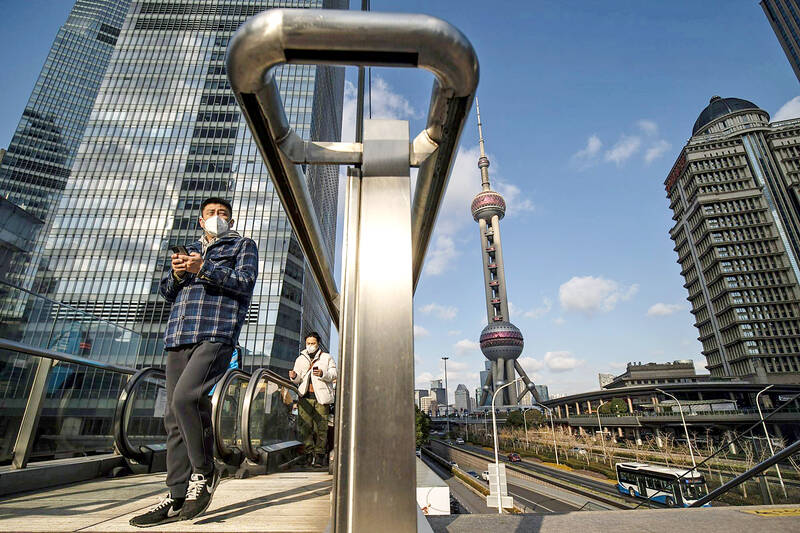China’s economy ended the year in a major slump as business and consumer spending plunged last month, with more disruption likely in the first few months of the year as COVID-19 cases surge across the country.
Official data over the weekend showed that the decline in manufacturing worsened last month, while activity in the services sector plunged the most since February 2020.
Separately, a private survey of businesses by China Beige Book International on Monday said the economy likely posted an annual contraction in the fourth quarter of last year.

Photo: Bloomberg
China’s ditching of strict COVID-19 controls last month fueled a surge in infections in major cities, prompting people to stay home as they fell ill or feared becoming infected.
While the outbreak has likely peaked in places such as Beijing, and economic activity is starting to rebound there, the virus is spreading fast across the country. A likely travel rush during the Lunar New Year holiday later this month could see cases spread to rural areas, disrupting activity in the first quarter of this year.
A private purchasing managers’ index survey yesterday confirmed the worsening decline last month.
The Caixin manufacturing index — which covers mainly smaller, export-oriented businesses — dropped to 49 from 49.4 in November.
However, businesses were optimistic about the future, with confidence in the 12-month outlook climbing to a 10-month high.
“China’s growth prospects have been improving with the reopening accelerating,” said Zhou Hao (周浩), chief economist at Guotai Junan International Holdings Co (國泰君安國際控股). “Overall, the darkest hour is gone.”
Economists expect a faster rebound once the infection wave peaks, with growth forecast to accelerate to 4.8 percent this year from an estimated 3 percent last year.
Still, the recovery is likely to be bumpy, and economic activity remains well below pre-COVID-19 levels.
Travel was relatively muted over the three-day New Year holiday.
The number of trips made was little changed from a year earlier, while tourism revenue was up 4 percent from the same period last year, the Chinese Ministry of Culture and Tourism said.
Tourism revenue was just 35.1 percent of the levels reached in 2019, while the number of trips were 42.8 percent.
China Beige Book, a provider of independent data, said its surveys found that the economy likely grew only 2 percent last year.
“With the ongoing COVID tidal wave, investment sliding to a 10-quarter low and new orders continuing to get battered, a meaningful first-quarter recovery is increasingly unrealistic,” China Beige Book chief economist Derek Scissors said.
Policymakers have pledged more fiscal and monetary support to aid the economy’s recovery this year. The Ministry of Finance last week said that fiscal spending would be expanded “appropriately” with the use of policy tools such as the budget deficit.
The central bank also vowed to support domestic demand and maintain credit growth.
China is likely to cut interest rates and the reserve requirement ratio for banks in the first half of the year, while raising the fiscal deficit ratio for this year, a survey of economists published yesterday in state media found.

In Italy’s storied gold-making hubs, jewelers are reworking their designs to trim gold content as they race to blunt the effect of record prices and appeal to shoppers watching their budgets. Gold prices hit a record high on Thursday, surging near US$5,600 an ounce, more than double a year ago as geopolitical concerns and jitters over trade pushed investors toward the safe-haven asset. The rally is putting undue pressure on small artisans as they face mounting demands from customers, including international brands, to produce cheaper items, from signature pieces to wedding rings, according to interviews with four independent jewelers in Italy’s main

Japanese Prime Minister Sanae Takaichi has talked up the benefits of a weaker yen in a campaign speech, adopting a tone at odds with her finance ministry, which has refused to rule out any options to counter excessive foreign exchange volatility. Takaichi later softened her stance, saying she did not have a preference for the yen’s direction. “People say the weak yen is bad right now, but for export industries, it’s a major opportunity,” Takaichi said on Saturday at a rally for Liberal Democratic Party candidate Daishiro Yamagiwa in Kanagawa Prefecture ahead of a snap election on Sunday. “Whether it’s selling food or

CONCERNS: Tech companies investing in AI businesses that purchase their products have raised questions among investors that they are artificially propping up demand Nvidia Corp chief executive officer Jensen Huang (黃仁勳) on Saturday said that the company would be participating in OpenAI’s latest funding round, describing it as potentially “the largest investment we’ve ever made.” “We will invest a great deal of money,” Huang told reporters while visiting Taipei. “I believe in OpenAI. The work that they do is incredible. They’re one of the most consequential companies of our time.” Huang did not say exactly how much Nvidia might contribute, but described the investment as “huge.” “Let Sam announce how much he’s going to raise — it’s for him to decide,” Huang said, referring to OpenAI

The global server market is expected to grow 12.8 percent annually this year, with artificial intelligence (AI) servers projected to account for 16.5 percent, driven by continued investment in AI infrastructure by major cloud service providers (CSPs), market researcher TrendForce Corp (集邦科技) said yesterday. Global AI server shipments this year are expected to increase 28 percent year-on-year to more than 2.7 million units, driven by sustained demand from CSPs and government sovereign cloud projects, TrendForce analyst Frank Kung (龔明德) told the Taipei Times. Demand for GPU-based AI servers, including Nvidia Corp’s GB and Vera Rubin rack systems, is expected to remain high,